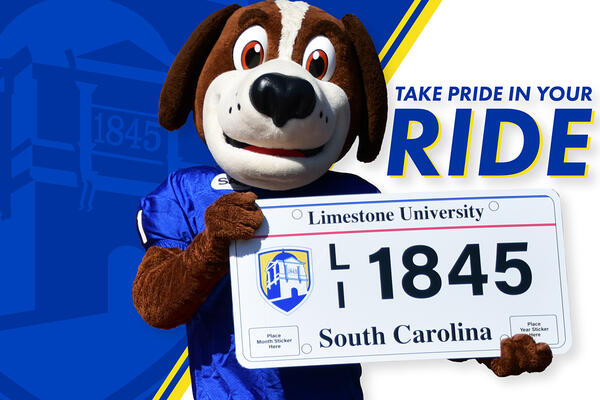November 20th, 2018
Faculty Member's Service Dog To Soon Be On Campus

“Moose” will soon be on the loose at Limestone.
In the near future, Dr. James (Jim) Prevost, Assistant Professor in Limestone College’s Athletic Training Program, will have his service dog, “Moose,” with him on campus at all times.
Prevost is currently getting “Moose” acclimated to his home and work environment. He noted that he now brings the dog to campus in the evenings, but it is time to get his four-legged friend accustomed to his daily routine. “Moose” recently dropped by the campus for a short time during the day and those visits will become more frequent.
For people like Prevost with Parkinson's disease, service dogs can be trained to perform a variety of helpful tasks, ranging from daily assistance with routine activities to specialized support. Service dogs can help with enhancing balance while walking or using stairs and reducing the risk of falls.
“Moose,” a black lab and malinois mix, was given to Prevost by Howard Young and his wife, Lisa. Young is a close friend to the Prevost family, and is a canine training officer in Shelby. Young knew a service dog could be beneficial to Prevost, so he and the Shelby community presented Prevost with the rescue dog from Florida. “Moose” has been in training for four weeks and has already shown tremendous progress.
“Our community has been nothing short of welcoming to ‘Moose,’” Prevost said. “He is in the process of getting socialized, and everyone has loved getting to know him, and ‘Moose’ has enjoyed it as well. There is currently not an established policy for a service dog to be on the College’s campus, but Limestone has been extremely understanding of my needs, and I am thankful for their hospitality and readiness to help whenever they can.”
Prevost is expected to assist Limestone in establishing its official service dog policy.
“Moose” is a registered service dog, and is specifically being trained to assist Prevost with any balance and mobility needs he may have due to his health.
“It has been proven that having a service dog improves motor responses, cognition, and heart health,” Prevost explained. “‘Moose’ is here to help me, but I would also like to use him as an opportunity to teach others about service dogs and their ability to assist those in need.”
For many people with Parkinson’s disease, pets provide both companionship and practical help with daily life. Plus, owning any dog, service or not, automatically writes exercise into an owner's schedule. Research shows that regular exercise helps many people with Parkinson's disease improve symptoms.
Prevost said that he wants the campus to be aware of his dog’s presence and does not want anyone to be alarmed if they see the two of them strolling around Limestone. He explained that while on campus or out in the community, “Moose” will always be by his side and on a leash. Prevost would like to invite anyone who wishes to meet “Moose” to drop by his office located at the Walt Griffin Physical Education Center.



